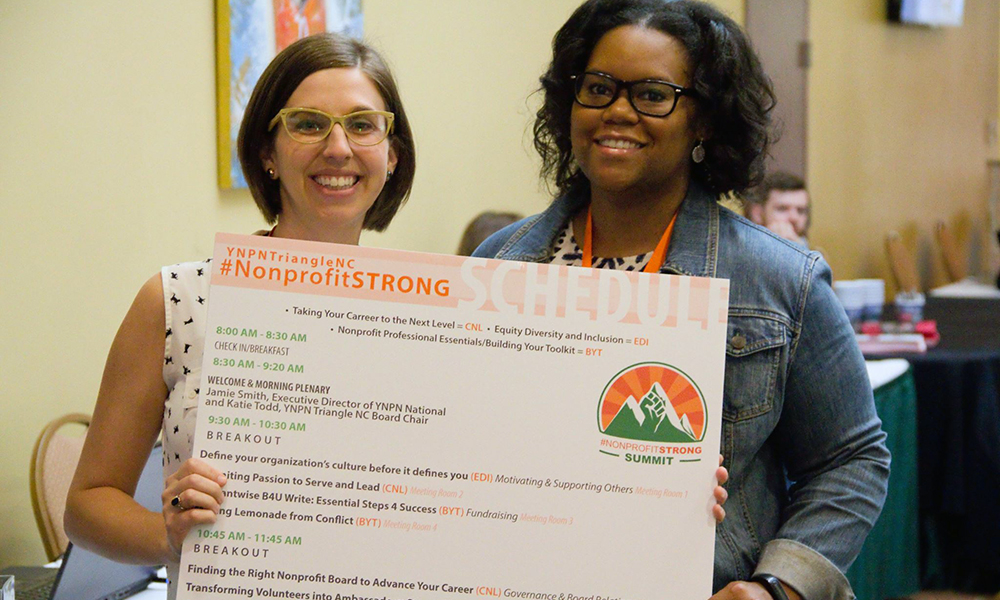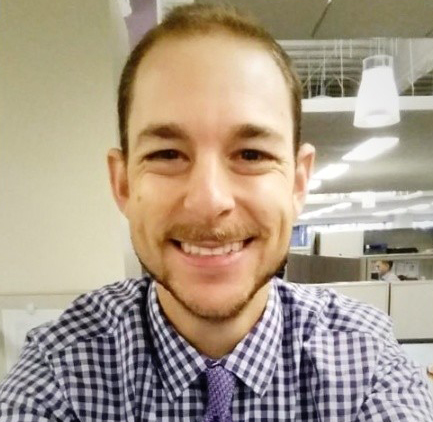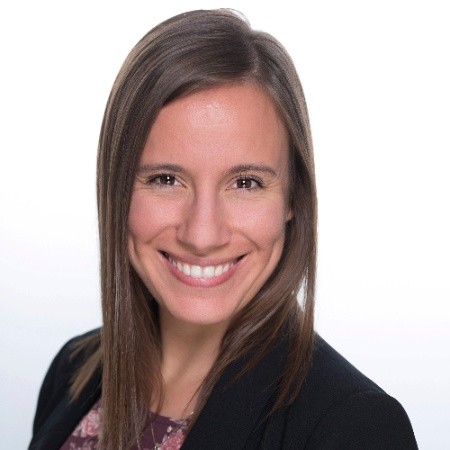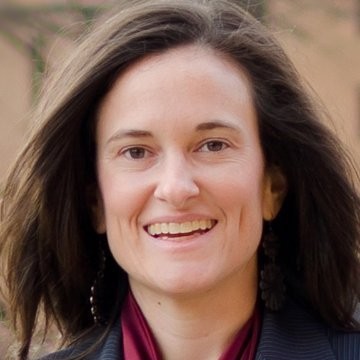
Photos by YNPN of the Triangle
Libby Richards (left), with the Triangle Community Foundation in Durham, North Carolina, and Tanaya Suddreth, of Democracy North Carolina, advocate for young professionals in nonprofit organizations. Here they take part in a gathering of the Young Nonprofit Professionals Network of the Triangle.
Youth-serving organizations are often staffed by young adults whose outlook and circumstances are different from that of their older colleagues.
Sometimes young workers want to remind their organizations to listen up.
Millennials have a strong desire for professional development, said Molly Rivera, board chair of the Young Nonprofit Professionals Network of the Triangle, based in Raleigh, North Carolina. The network supports skill-building and resource-sharing among young adults in nonprofits.
The network “believes that every organization or nonprofit has a responsibility to the young professionals on its staff,” she said. Youth-serving organizations by nature should have a commitment to young adults, she said.
In addition to professional development, millennials also want opportunities to make connections with others their age in the nonprofit sector, she said. In this way, they can problem-solve and gain support and information.
Rivera works as communication associate at the American Civil Liberties Union of North Carolina.
Organizations should set up processes for feedback from colleagues, which is helpful to young adults, she said.
Core needs of young professionals

Brian Rosenbaum
Millennials are in the early stage of their careers and want to feel they’re moving forward, making an impact, growing in their roles and developing into the adults they envisioned themselves becoming, wrote Brian Rosenbaum, board chair of Young Nonprofit Professionals Network of Los Angeles, in an email.
“Nonprofits can meet these core needs many ways, and each organization should do some soul-searching to determine their strengths and capacities to meet millennials where they’re at,” he said. Rosenbaum works as engagement manager for United Way of Greater Los Angeles.
Rivera said millennials tend to have a strong commitment to equity, diversity and inclusion.
“We’ve grown up in a much different environment. We’re pushing movements like Black Lives Matter,” she said. “We bring that with us in our work.”
But millennials also came of age in a recession, and many are burdened by large amounts of student debt.
“We’re working for the greater good but we still have bills to pay,” Rivera said.
Low pay in the nonprofit sector makes it all the more important for young adults to develop their skills, including self-advocacy, as well as gain networking opportunities, Rosenbaum said.
Low pay and lack of resources to do the job were among the problems Pele IrgangLaden reports facing when he worked part time in a Philadelphia after-school program in 2017 run by CORA Services. The nonprofit serves about 20,000 children and families a year, providing academic support, counseling and referral services in both schools and the community, as well as after-school and summer learning programs, according to its website.
Low pay, skimpy resources not appreciated

Molly Rivera
IrgangLaden worked in an after-school program at the pre-K-8 Thurgood Marshall School from September to December.
“In that time I went from being one of the newest to the second-most senior staff member dealing with children” in the program, he said.
CORA received a large grant to expand the program from 30 to 75 kids, but “the program operated from a scarcity or poverty model,” he said.
Art supplies for the kids consisted of paper, pens, water and flour, IrgangLaden said.
Another nonprofit, City Year, also provided an after-school program at Thurgood Marshall.
“Our kids were jealous of the City Year kids,” because they had cooking projects and art projects that the CORA program didn’t provide, IrgangLaden said.
He was paid $12 an hour, he said. A co-worker there for four years had received a 20-cent raise, he said. All were 30 or younger and some were working several jobs, he said.
When the program began serving 75 kids, CORA “would bring in brand-new untrained people” to try to fill gaps, he said.
“When I left, I wrote them a letter. They really did not treat our staff with very much respect,” IrgangLaden said. In fact, he felt that the young staffers were treated with suspicion.
The organization “put their resources into paying white-collar workers instead of the young people who interfaced with the children, he said.
CORA CEO responds

AnnMarie Schultz
AnnMarie Schultz is chief executive officer of CORA Services.
“We have a very good reputation here in Philadelphia around after-school programming,” she said. The after-school sites are well-supplied, she said.
In September, a large grant had been awarded but was delayed.
“We were told [by the funder] to start in September but the funds were not released until much later,” she said.
“We had made promises to our schools” and had to expand the program prior to having funds in hand, Schultz said.
A new employee who had come on board at that time might have experienced the organization differently than others do, she said. However, “Everyone’s experience is real.”
She acknowledged the low pay in the nonprofit sector.
“OST [out-of-school time] does not pay well. It just does not pay well,” Schultz said. As a result, CORA Services asked itself what it could do to support its part-time staff working in after-school programs.
“We decided to make sure the staff gets paid days off,” she said. Employees are paid for holidays, snow days and the gap between the end of school and the start of summer programs, she said.
About 53 percent of CORA Services staff are millennials, Schultz said. The organization recently went through strategic planning with about half of employees voluntarily taking part in an interview process to provide feedback about the organization.
What emerged was that employees felt a core strength of the organization was that it supports individuals and families, she said. “It’s talked about all the time” within the organization, she said.
CORA Services is open to hearing criticism, and she works to make sure that communications remain open, she said.
IrgangLaden, a labor organizer who described himself as “attuned to my rights as a worker,” concedes that CORA Services does offer partial health benefits.
After graduation from Temple University with a bachelor’s degree, “I found myself with $20,000 in student debt and the looming loss of health insurance,” he said.
Since college, he’s worked in food service, child care and political organizing.
He is concerned that “nonprofits are taking on a corporate model in valuing upper-level workers and exploiting the other people.”
“The least valuable workers are the ones who directly interface with the ones they are claiming to serve,” he said.
The cost to nonprofits
Rosenbaum said nonprofits that offer too-low wages are “shooting themselves in the foot.” However, he wrote in an email: ”That’s little consolation for someone making $13 an hour after taxes.”
Rivera believes that when organizations advertise jobs, they should provide a salary range. Transparency is important, and it allows applicants to be better informed, she said.
She also challenged the idea that low administrative costs should be a big measure of a nonprofit’s effectiveness.
“Another thing we want to do is change the conversation in the nonprofit sector around overhead costs,” she said. “You can’t operate without overhead, and it includes salaries.”
Training for accountability
An important concern that involves younger staffers is accountability. Young adults may sometimes be only three or four years older than some of their clients, Rosenbaum said. This “near-peer” relationship can facilitate good rapport and an understanding of the world the clients grew up in, including their technology and communication preferences.
But the age similarity may carry unique risks, he said. Sometimes rapport can turn into attraction.
“Accountability is … more difficult between near-peers if the employee in the leadership position does not have proper training,” he said.
Young adults working with youth should have a strong understanding of their position as mandated reporters of abuse, Rosenbaum said. And situations involving child abuse, domestic abuse and self-harm can be overwhelming to those with limited experience and training, he said.





























